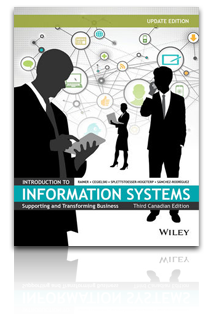Description: Thousands of websites and millions of pieces of private data are increasingly in one big cloud, where some of the old rules of data security are out the window.
Source: Fortune
Date: Sept 24, 2010

With the rise of cloud computing companies, and the ferocity with which tech’s biggest companies are snatching those firms up, it’s no secret that a good chunk of our user data is already stored in the cloud. Our emails, our documents, our social network profiles and hundreds of thousands of tiny startups already rely on cloud services like SalesForce.com to be more productive and cost-effective. Click here for rest of story
Questions for discussion:
- Why factors contribute to the growth of cloud computing in the enterprise?
- What risk’s are businesses exposed to when they choose to use cloud computing?
- If you were in charge of IT infrastructure of your university, what advice would you give to your university if they were looking at going to a cloud computing model?


Danielle Aubin
If the university was looking into using cloud computing I would first of all explain it in “English terms” as not everyone understands computer lingo. I know this first hand as I never knew any computer lingo, or anything about computers for that matter, before I started this course. I could use the basic functions such as research and word processing. I still cannot hook anything up to coordinate with them though! Anyways back to the topic. I would explain to them the benefits such as there are no upfront costs, no maintenance costs and it is easily accessible. One of the main advantages would be that you can have the most up to date software without having to dish out many costs to constantly update. I would also make them aware of the risks. Such as security – the main concern regarding cloud computing. Once all of these are made aware I would weigh the risks against the pros and see if it is worth it. Just because there are risks involved would not eliminate cloud computing as an option since everything has risks associated with it.
Craig H
Cloud computing worryes me for a few reasons, one because if i decided to delete my facebook account somewhere out there (who knows where) my information is still being stored and kept but for what reason? I think that if someone decides they wanna delete something (facebook, paypal) whatever it may be that the information assosicated with that is also completely terminated. The major concern here is not the provider of the service (who your providing your info to origonally), its the third party hackers who are able to access this information. With no assurance that data is being completely destroyed when deleted i think its safe to say no user data is not safe in the cloud.
Lauren Kingston
Cloud computing is a great idea from many different aspects. It makes it easier for people to access, manipulate and share data. The accessibility of this data from virtually anywhere is a huge reason that cloud computing has become so popular. I use cloud computing for things like email and social networking and quite enjoy how simple it is to access these programs from any computer or mobile device. The security risks associated with cloud computing are quite troublesome. I think that beyond personal use, the risk of security breach is very high for businesses. The fact that someone could “hack” and gain vital data such as credit card numbers is simply unacceptable in the business world. Thus, I think that cloud computing is wonderful for personal, non-financial use but is not ready for business use by security standards.
Alyssa Brink
Cloud computing has its benefits and its disadvantages. When looking at it from a business perspective I believe there are many risks associated with it. Although it is a great way to access information, it also can make it easier for hackers to invade a business’ private information. For instance, the article explains how if two systems are connected to one server and a hacker gets into computer A, then it has the potential for easy access to computer B as well. For major companies this could be devastating as someone could gain access to their private information and potentially release it out into society. A lot of businesses have people’s credit card numbers and personal information in their systems and for someone to be able to access that information could cause the business to lose their customers in the future.
Seth E.
Cloud computing is the way of the future. I do not believe, however, that it will be necessary to store all of our data in the cloud. It is very convenient for companies to use a cloud provider, but as the article states, they need to do their homework and make sure that the provider is doing everything they possibly can to keep the data safe. Just as cloud computing is the way of the future, cyber crime is the future of crime. As the “average” person becomes more and more technologically competent, security will have to increase more and more to keep data safe. We already trust companies to host our e-mail, to provide telephone service, to provide internet, so basically if anyone really wanted to steal personal information, it doesn’t even have to be in the cloud. We will see security risks whether the cloud exists or not. Companies have prevented security risks in the past, so it is possible to keep data safe in the cloud.
JP Pohl
This all boils down to the ability of companies, and/or the individual, to do their research into what cloud computing actually entails. There seems to be an onus now on trusting whatever a company says they offer without properly looking into what you, either as a customer or the representative of an interesting buyer, actually needs. Online banking and online PCI systems ran into initial hesitation at first as well when it came to questions about data security and the integrity of the systems in place, but as companies realized the profits that could be made through e-commerce, they overcame their fears. I think the same truth will apply to cloud computing; companies will recognize that their ability to maximize their profits will allow them to allay their own concerns about what they’re risking when they upload their info up into the ‘cloud’.
Brittany H
There are many risks that businesses exposed to when they choose cloud computing. When businesses use cloud computing they may not know where their data ends up. And the chance that their data could be hacked and their information could be seen is a big risk that businesses take when they use cloud computing. And if you end up on the same server as somebody they can get your information. Another risk businesses take when they use cloud computing is that a third party deals with their data and it could be possible that they might look at it. Cloud computing is not a bad idea but you should be careful of what data you send into the cloud. If it is really personal or vital to your company maybe you should find a better place to store it. That if managed right may be a more secure place.
brian rollag
I believe that the biggest risk in cloud computing is not having the knowledge to properly operate the system and minimize risk. As mentioned in the article if you don’t know what questions to ask when searching for a provider this can leave you in a vulnerable position. Another risk is not having a proper risk assessment or backup plan. Today it seems like it is 100% impossible to protect your information online and especially with new technology like cloud service. So being well pre paired and educated in cloud service I believe will minimize most of the risk with this technology.
Bryce G
Cloud computing is a very attractive way of providing services to the consumers of today, however there are risks associated with these benefits that are provided to us. As many of us allready use some form of cloud computing and are becoming slowly more aware of how this technology works, we must be aware of downfalls of the technology. Personally I feel that companies that provide the services must have comsumer protection as a very high priority. Holding them responsible for data theft/leaks would push these service providers to be more proactive in consumer protection of data. As more and more businesses have these “mishaps and accidents” there should be a strong consumer push for accountabilty for their actions. Until these companies do all the can for us consumers, this will continue to be a daily fact of life; with the prospect of increasing identity theft also on the rise.
Joana H.
Cloud computing present, of course, appealing features to the majority of companies, which are always seeking for new ways to cut costs (cost-effectiveness) and be productively more efficient. Therefore cloud computing has grown so much in the last few years. Nevertheless, lots of downsides risk to minimize the profit a firm could get from going to a cloud computing model. First of all, most cloud service providers not PCI compliant, and therefore do not respond to certain global information security standards. Secondly, a problem is the way a cloud service provider encrypts client data (all in the same way or different applications?). Another issue is that some cloud providers store data from multiple clients on the same physical server, risking that companies in the same server “hacker” their neighboring companies data! Moreover, there’s the concern about the use of third-party companies for various components of a cloud service, which not necessarily have the same standards.
Therefore, I would advise my University to search properly before choosing a cloud service provider, to be cristal clear throughout contract negotiations, to get as many as possible “details on how data will be physically stored, how well it will be encrypted on physical servers that share storage space with other client data, whether the provider employs third parties, and what those companies’ operational procedures are”. Furthermore, they should request to be notified about any bad or good thing that happens, as well as be sure to have a “first right of refusal when hiring third parties, separate physical servers and cabinets, and/or separate data encryption services”.